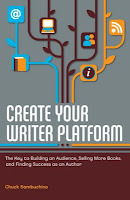 |
| A good blurb can entice someone to learn more about a book. |
What are blurbs?
Blurbs are those pesky little quotes on the front and back covers of books. For instance, the 2013 Writer's Market, which I edit, has one on the front cover from Sandra Beasley, author of Don't Kill the Birthday Girl, that reads, "To buy Writer's Market is to take charge of your publishing career. To give Writer's Market says 'I believe your voice needs to be heard.'"
Basically, they're endorsements for a book or author from a trusted source. They are recommendations.
Do I need a blurb for my book?
Recently, I engaged in a chat on Facebook about whether blurbs are even worth the time or effort of placing on a book. I mean, do they even affect book sales? Do potential readers even care?
Here's the thing about blurbs: It's going to be different for each reader. Some people will breeze past the blurbs without any notice; other people read everything on the front cover, back cover, and even introductions and forewords. But...
Book covers definitely sell books.
Attractive and professional-looking book covers sell books. Ugly and unprofessional-looking book covers can kill book sales. It's not fair to the manuscripts, but most readers really do judge books by their covers. (Sorry, I couldn't resist, but it's true!)
Blurbs enhance the professional look of a cover. Including blurbs from trusted sources adds an extra level of validation to a book. It might not seal the deal, but it might entice a potential reader to crack the cover and read the first page or two before deciding whether to buy the book.
And really, I'm pretty confident that blurbs don't harm book sales--unless it's really bad or inappropriate. However, if that's the case, the book is probably really bad and inappropriate as well, right?
How do I get blurbs for my book?
First, you can contact sources directly. In my case, I have a short list of poets who I'm planning to contact to see if they might be interested in viewing my manuscript. My first message will probably go something along the lines of, "Hey, you interested in taking a look at my manuscript and possibly providing a blurb for the cover?" No need to beat around the bush.
If the poets say, "Sure," I'll send along the manuscript with a deadline for when I need the blurbs back (probably padding the deadline a little--just in case). Hopefully, they'll love what they read and send me a nice sentence or three about my book.
Another source of blurbs might be from past mentions and accomplishments. In my case, I'm wondering whether to include past mentions--like in the November 2012 issue of O, The Oprah Magazine, Samantha Reynolds wrote, "I have a poet crush on Robert Lee Brewer." Who wouldn't be interested in slapping that right on the front cover of a book? It says everything that a poet wants to hear!
What are your thoughts on blurbs? Do you think they're important? Do you (or would you) bother with them for your own book?
*****
Connect with me on Twitter, Facebook, and LinkedIn. Plus, sign up for free e-mail updates from this blog in the top right-hand corner of the page.
*****
Check out these other Not Bob posts:
- Solving the World's Problems, by Robert Lee Brewer.
- How to Build (or Improve) Your Writer Platform in 30 Days.
- Best Blogs for Writers to Read in 2012.
Create Your Writer Platform: The Key to Building an Audience, Selling More Books, and Finding Success as an Author
by Chuck Sambuchino
If you want a book that covers platform in all its variations, this is the title for you. Chuck Sambuchino is the author of humor titles such as How to Survive a Garden Gnome Attack and Red Dog Blue Dog, but he's also behind Guide to Literary Agents and Formatting & Submitting Your Manuscript. In other words, he's been there, done that, and lived to tell about it. Chuck covers social media, blogs, newsletters, public speaking, and more. Click the link above to check it out today.


14 comments:
Hi, Not Bob. I got blurbs for my poetry book and probably needed them to help sell it. (You know poetry is a hard sell anyway.) I look at blurbs, but also know what a racket they are, authors helping each other and all that.
Yeah, it's interesting, because I've been in the publishing business for more than a decade, and I still look for blurbs on books. And I almost think of them as showing who hangs out with who, though I know that's usually not the case at all.
I remember one of my poetry professors sharing the process of getting blurbs for the back of her first full collection, and her remarks were similar to your own. As a reader of poetry, I'm usually far more interested in the author than the blurb-er ... At the same time, I'm interested to see who provided blurbs and what they actually say. But would a lack of blurbs keep me from buying a book? No way.
A lack of blurbs wouldn't keep me away, but sometimes a nice blurb might push me over the edge as far as opening the cover to read the opening lines and flip through the poems. That's if I'm being completely honest about how I am sometimes when I'm browsing in bookstores.
This is how I buy poetry: based on titles, covers and who the blurbers are and how much I trust them, and recommendations from friends. I will buy any book from a poet I already know I like from their blog or from lit mags.
I decided on using only two blurbs on my third book, but they were great poets AND poets about whom I thought - people who like their poetry will also like my poetry.
It depends on the genre for me. For fiction and memoir, I no longer look at the back covers before reading--too many spoilers. Also, experience has taught me that fiction blurbs rarely jibe with my reading experience. Similarly--just to get all my book-buying prejudices out in the open--if it roars "Bestseller!" on the front cover, I'll probably hate it as an over-hyped mediocrity.
For nonfiction and poetry, I do pay attention to blurbs if I am not already familiar with the book or author. As Robert said, a lack of blurbs won't keep me from buying, but may push me over the edge into buying the book.
Blurbs are important for marketing. They exist not only on the back cover, but also in press releases and in introductory comments at readings. Also, imagine a potential customer considering your collection. She turns (yes, most poetry buyers are women) the book over to read the blurbs. Blurbs help sell books.
For a first book, you definitely want some blurbs on the back cover. I like blurbs that are specific, that tell me something about THIS book, that couldn't have been written about any other book. Avoid generic ones as they are untrustworthy. Also, avoid blurbs that are excessive in their praise--especially for a first book. E.g., A major American classic! Rivals Robert Frost. Three blurbs is plenty. More than four is simply gluttonous--that really turns me away from a book. Those are my guidelines, not carved in stone anywhere.
I don't read blurbs. I read the description on the jacket flap and then I open the book and read a bit of the first chapter, first poem, or whatever. Perhaps I'll flip through the book.
Opinions on what's good, readable, and the like vary widely. Unless someone is a personal friend whose taste in books I know, I have no basis for relying on their opinion. There are many, many books of all genres beloved by others that leave me cold.
I understand blurbs are a useful selling tool, and I'll seriously consider going after some for my next book if I have control over the back cover.
While waiting for our table to become available on Mother's Day 2011 my husband and I went to a nearby bookstore. I went to the memoirs section. I picked up a copy of Marjorie Hart's Summer at Tiffany about the summer of 1945 when she and a friend were employed there as pages. A blurb from USA Today ended with "It's a perfect Mother's Day gift." I knew the book was meant for me. I like blurbs and would seek to obtain them for any forthcoming book of my own.
Definately useful, like most of your posts, but for a first book for someone who doesn't have many contacts, how would you go about finding people to write them? I understand it can be hard to get a good reviewers attention pre-release and in my chosen genre it's even more difficult.
If I don’t recognize the blurb source, then the blurb has less meaning for me – UNLESS it is humorous. Humorous blurbs always tend to stick in my head, and help persuade.
If I do recognize the blurb source, then I’ll take a closer look at the book author – trying to determine how THEY got THAT famous source to blurb on their brand new book.
Should an author look for blurbs before getting a book published, as a way to pique publisher's interest? Or is that something that only should be pursued after getting a publishing deal?
Hey Grace. Getting a blurb is definitely something to do after the publisher has accepted the book. However, it's a great idea to start making connections with other writers now. That only helps on several levels.
Post a Comment